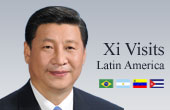Russia ready to work with OSCE to de-escalate Ukraine crisis
(Xinhua) Updated: 2014-09-04 20:03MOSCOW - Moscow is ready to take practical steps toward the de-escalation of the conflict in Ukraine in line with the plan proposed by Russian President Vladimir Putin on Wednesday, Foreign Minister Sergei Lavrov said Thursday.
"We will be ready together with the OSCE in the contact group to help the warring parties practically make progress on the way to stabilize the situation. We hope these calls will be heard especially by Kiev, Donetsk and Lugansk," Lavrov said at a meeting with Organization for Security and Cooperation in Europe (OSCE) Parliamentary Assembly President Ilkka Kanerva.
"Yesterday's proposals, which President Putin voiced after his telephone conversation with Poroshenko, are on the negotiation table," the Itar-Tass news agency quoted Lavrov as saying.
"We hope the conflicting sides in Ukraine will make use of these ideas and try to come to an agreement at the upcoming session of the Contact Group," he said, adding that the OSCE with its special mission in Ukraine is expected to play a key role in organizing international monitoring of the ceasefire.
Putin proposed a seven-point plan on Wednesday to stop military clashes in southeast Ukraine. Earlier in the day, he talked to Poroshenko on "concrete steps to promote a ceasefire between the militia and the Ukrainian forces."
Lavrov called the recent claims of Ukraine joining NATO as "obvious attempt to derail all efforts" of the peace process.
"It is necessary to curb such attempts, stop provoking such approaches from abroad and work together toward the same goal of ensuring national unity in Ukraine," he said.
The minister also said it seemed that none of the countries that signed documents with Russia, like the Geneva statement of April 17, is interested in implementing those agreements, accusing the insincerity of Brussels and Washington.
Kanerva said it is impossible to settle the Ukraine crisis by military means, calling for political solutions.
"It is necessary to work out a political solution and organize a political dialogue to prevent a large-scale crisis in the center of Europe," Kanerva said, adding that the aim of this visit is to contribute to the settlement of the crisis.
The delegation would not arrogantly or aggressively urge or persuade Moscow to do anything, the Itar-Tass news agency quoted Kanerva as saying.
He called on all the conflicting parties not to create further provocations and take a constructive approach to settle all the problems.










